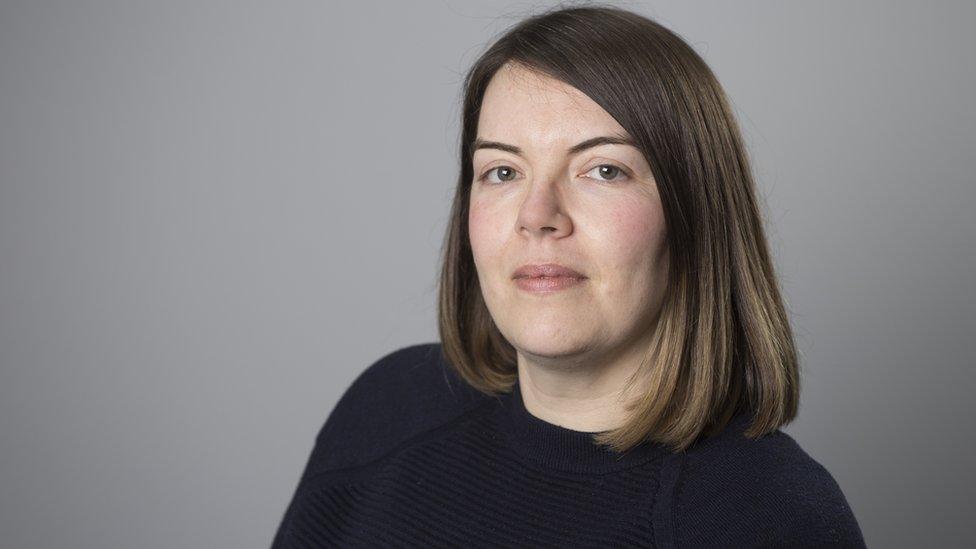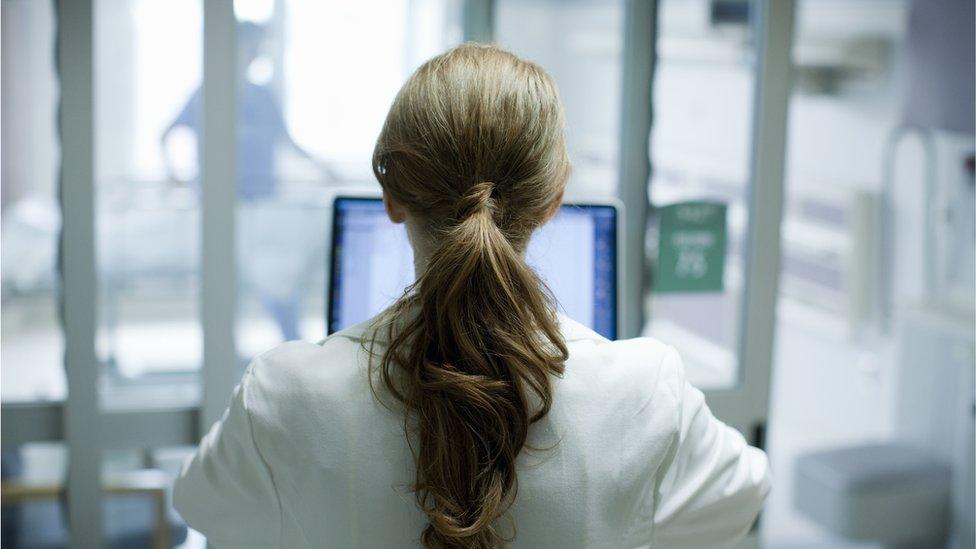Sexism in the workplace: Women scared to speak out in NHS
- Published

GP Bethan Roberts said sexism "feeds into a wider culture of fear" in addressing issues
Women working in the NHS in Wales have been patronised and belittled while at work, a survey by the British Medical Association (BMA) has found.
The survey found 88% of doctors thought there was sexism in the NHS and called on the organisation to educate people against discriminatory behaviour.
GP Bethan Roberts said the results shone a light on the prevalence of sexism in the workplace.
The Welsh government said it took discrimination "very seriously".
What did the report find?
The BMA's UK-wide survey, external of about 2,000 female doctors found 91% have experienced sexism at work, with 42% feeling they could not report it.
In Wales, 88% of respondents said they felt structural and institutional factors that disadvantage women are the main drivers of sexism in the NHS in Wales.
Also, 35% said they experienced at least one example of sexism in the past two years, while 21% said this had happened once a month and 26% said they had witnessed sexism on a daily basis.
Dr Roberts, also the equality champion for the BMA's GP Committee, said she was not surprised by these statistics and it was not just confined to doctors.
"People will have had very different experiences and so it's important for the survey results to be publicised - just because something is invisible to some doesn't mean it isn't happening at all," she said.
She said structural problems were part of the problem, but it fed into "a wider culture of fear of repercussion for addressing issues".
She said: "I think sexist attitudes and behaviours are most likely a combination of NHS structures tolerating sexist behaviour by individuals, junior doctors rotating out of hostile work environments - resulting in a reliance on staff moving out of departments rather than fixing the problem - and a reluctance by junior doctors to raise concerns for fear of this impacting negatively on career progression."
She added it was "so important" to report sexism, but often women felt like they could not due to an impact on their career.
A separate UK-wide report by the Unison union, external found three in five nurses have experienced sexual harassment at work.
Some said they were expected to put up with abusive behaviour because it was seen as "just part of the job", while a number described it happening so frequently it had become "normal".
As many as one in nine (11%) said they often encountered such experiences and 21% reported occasional harassment.
Of those who had been harassed, only 27% reported it to their employer.
Others said they did not believe the issue was taken seriously and 35% said not enough was being done to protect them from sexism in the workplace.
What does this sexism look like?

One doctor who anonymously responded to the survey said she has been told her career choices are not good for women
Doctors in Wales who shared their experiences anonymously said they have received patronising comments, been judged on their appearance, overlooked in their career progression, or been ignored by patients and other doctors in favour of their male colleagues.
One doctor said: "On numerous occasions, I've heard a specialty isn't good for women, especially if you want a family etc. I very frequently get mistaken by patients for nursing staff, often despite introducing myself as a doctor."
Another doctor said: "I was once told my place was in the home and raising kids and I'd soon get bored of being a doctor.
"Endless mansplaining in handovers with male members of the team endlessly talking over the females and making the same exact point after a female has said it."
Dr Roberts said being called "dear", being asked to make tea or do jobs male doctors are not asked to do are just some of sexist microaggressions she has seen.
What needs to change?
She said a lack of training and awareness of discrimination is one of the main reasons this behaviour still existed, something she said needed to be addressed.
She said equality training should be both "mandatory and meaningful" for all in the NHS, but "equality and diversity discussions should ideally begin at an early age so that we all know how to behave with respect towards others, irrespective of the number of protected characteristics we or others might possess".
She added that reporting needs a more "robust" system as some that exist are a "bit opaque".
"Certainly ,for the junior doctors who might not feel able because of the way that training works, they might not feel able to take it to their supervisor who might be the person who they want to report. It needs to be totally separate," she said.
"So, I think that that almost needs to be a separate mechanism that is open to everyone."

Manish Adke said the survey confirms concerns he has had for many years
Manish Adke, co-chair of the BAME forum in Wales, said: "I had my concerns for many years about discrimination on gender and sex. Sadly, this survey has just confirmed my observations.
"We, as the BMA, must engage with employers to eliminate the sexism and gender inequality within NHS by improving education, training, support and raising awareness.
"It is also important to have a defined mechanism through which staff can raise concerns regarding discrimination and appropriate actions are taken against those who continue to discriminate colleagues.
"Female gender-pay inequality is a direct manifestation of discrimination in career progression, lack of opportunities given to female staff and male-dominant culture in NHS. We need to work together to eliminate all forms of discrimination and make NHS safer place to work."
The Welsh government said: "Any form of prejudice or discrimination is entirely unacceptable, and we take these matters very seriously. We continue to work with the NHS to tackle all forms of discrimination and expect all NHS Wales staff to be treated with dignity and respect.
"Policies are in place to ensure NHS organisations take action to address any concerns raised to them and all staff are encouraged to raise any worries.
"We are working with NHS employers and trade unions to explore how staff can better raise any concerns about working practices or care."
Related topics
- Published8 August 2021

- Published27 July 2021

- Published17 June 2021
